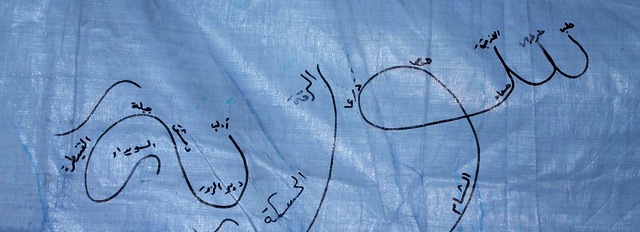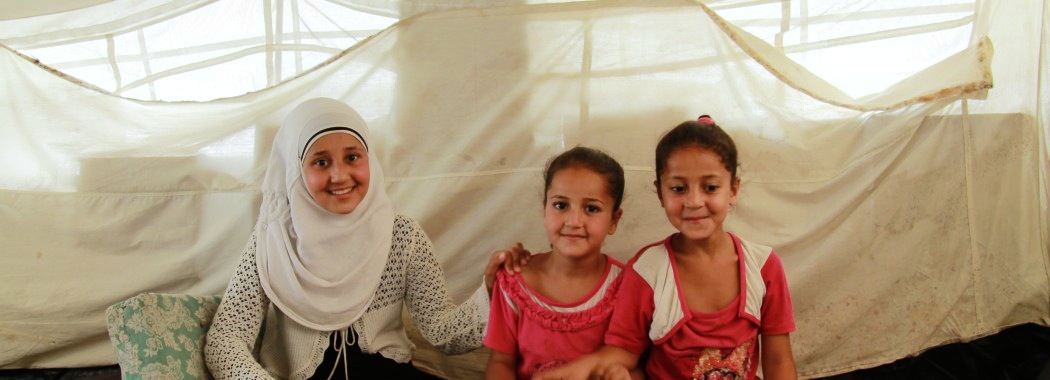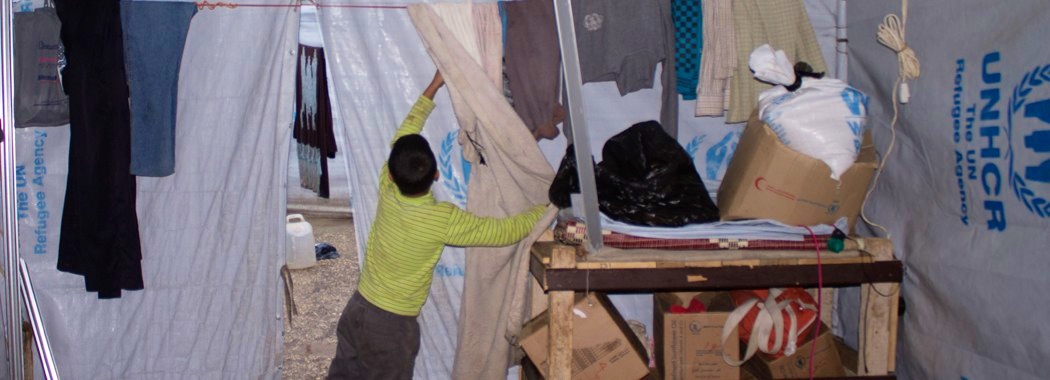The Teacher: How One Woman Educated an Entire Camp – by Ghenwah Yusuf

Umm ʿAbdu’s daughter, Siham, drew her own map of Syria with all the governorates on the tent where her mother teaches in government-controlled Tartus. (Ghenwa Yusuf/Good Morning Syria)
Umm Abdu abandoned her education when she got married. But after the war broke out in Syria, she fled the opposition-held neighborhoods of Aleppo for government-controlled Tartus, and devoted her life to tutoring children.
TARTUS, SYRIA – When she first came to Tartus, it did not occur to Umm Abdu that she would be called “Umm Abdu the Teacher,” especially since she had to abandon her studies upon marrying at an early age.
After all, taking into account the customs of her old neighborhood in Aleppo, a girl’s marriage can affect her education. Nevertheless, after giving birth to five children, the woman still says: “I used to dream of becoming a midwife, like the one who helped me during my pregnancy.”
In Aleppo
Umm Abdu passed her dream on to her children, trying to help them to achieve the best results in school. She would sit with them as soon as they came home, not only to make sure they finished their homework, but also to prepare for their next lessons. She would resort to various means to encourage them to learn, promising those who achieved the best marks both pecuniary and in-kind prizes.
Once she felt that her job was done, she would move on to her housework.
The War
It had been two years since the children dropped out of school. As government aircraft engulfed the sky of Aleppo and hunger fought its way into its streets, Umm Abdu sent her children Siham and Abdu to the grocer’s shop to buy a notebook, a pencil and an eraser. The grocer wondered in amazement: “What could Umm Abdu possibly need a notebook, a pencil and an eraser for amidst all this destruction?”
The woman tutored her children herself. She helped Siham and Abdu in math and Arabic, and taught Nur and Hala the alphabet and numbers, as well as some Quranic verses.

Umm Abdu’s daughters, Siham, Hala and Nur in the Old Garage camp in Syrian government-controlled Tartus. (Ghenwa Yusuf/Good Morning Syria)
However, as the war grew heavier and the destruction wider, Umm Abdu and her husband decided to leave for Tartus and live in the Old Garage camp in the city, in a tent where kitchenware is mixed with schoolbooks.
In Tartus
What was Umm Abdu thinking about at the time? It is summer … There are only two months left before another school year begins, and she must help her children prepare for it after being out of school.
The empty UNICEF tent was a chance for Umm Abdu to expand her idea so as to include all the children in the camp. “Just like old writers who used to teach children how to read and write in mosques, sitting on rugs, I gathered the children in the camp after sending word to their mothers to provide them each with a pencil, a notebook and a rug to sit on. I would give them lessons almost every day for two hours or more,” the woman explained.
“Some of them were completely illiterate, while others required lessons in maths, English, Arabic and other subjects. Everyone at the camp then started calling me ‘Umm Abdu the Teacher,’” she added.
Umm Abdu “the Teacher” soon caught the attention of the camp’s supervisor and director, who introduced her to the associations and organizations working there that were willing to help in any possible way.

Umm ʿAbdu’s son, ʿAbdu, in the family’s tent in government-controlled Tartus. (Ghenwa Yusuf/Good Morning Syria)
Camp Supervisor and “Liaison Officer”
As trustworthy as she was, Umm Abdu became the camp’s lead supervisor, preparing lists and statistics, and overseeing distributions and role division. She takes note of the camp needs and mediates to solve problems, trying as much as possible to help those who truly need it. She also prevents cheating, as some would attempt to take a bigger share of aid.
Umm Abdu’s relations further exceeded the camp supervisors to reach local independent activists in the city, such as the Ubur volunteer team and al-Shaala Centre, that had heard of Umm Abdu and contacted her; they offered to give the camp residents a hand or to help solve any problem they may encounter. This is how Umm Abdu liaised between the camp and its surroundings.
Although the camp is a miniature image of some of Aleppo’s neighborhoods with all their customs and traditions, Umm Abdu is just like many other women in camps who, due to the war, had to endure their harsh circumstances alone, or undertake roles they had never played before, in order to obtain the least of their rights as well as their family’s.
When a father sexually assaulted his own daughter in the camp and people attempted to conceal the incident by forcing the girl into a “shame marriage” (zawaj sutrah) to preserve her honor, Umm Abdu mobilized local activists who intervened to prevent this union. The girl was then sent to a rehabilitation center and the offender to prison.
Back to Where it All Started
When you ask Umm Abdu about the war she witnessed in Aleppo, she holds her cheek with the palm of her hand and says: “What a disaster! There are no schools left in Aleppo.”
Apart from all the commotion about Umm Abdu “the Teacher” in Tartus, the woman is still determined on keeping her daughter Siham in school until she becomes a certified midwife, as her father is no longer the only decision maker in this family.
This article was originally published by Good Morning Syria
Ghenwa Yusuf
Ghenwa Yusuf, from Tartus, is a Law graduate. Her activities span photography, social and humanitarian work, and archaeology.